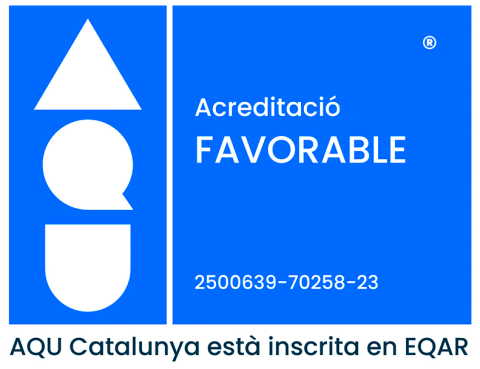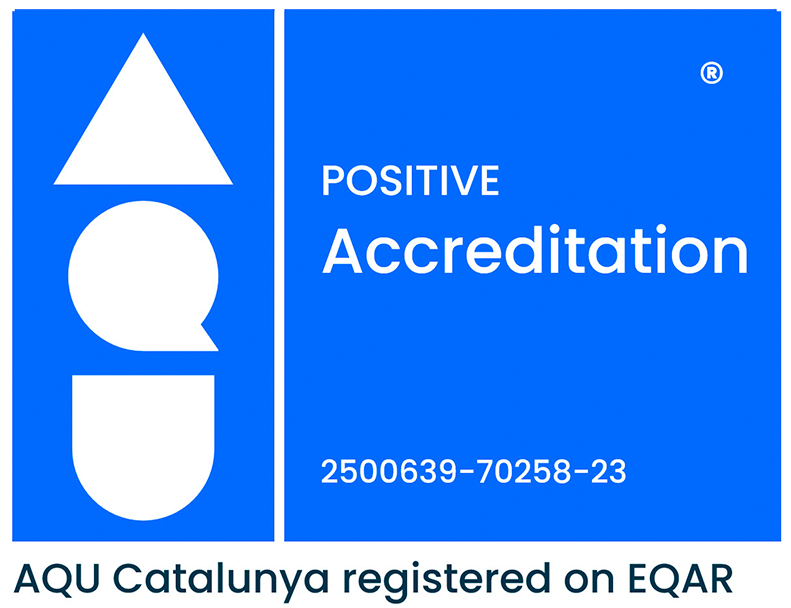Bachelor's Degree in Nursing
Welcome Session
Leadership Program
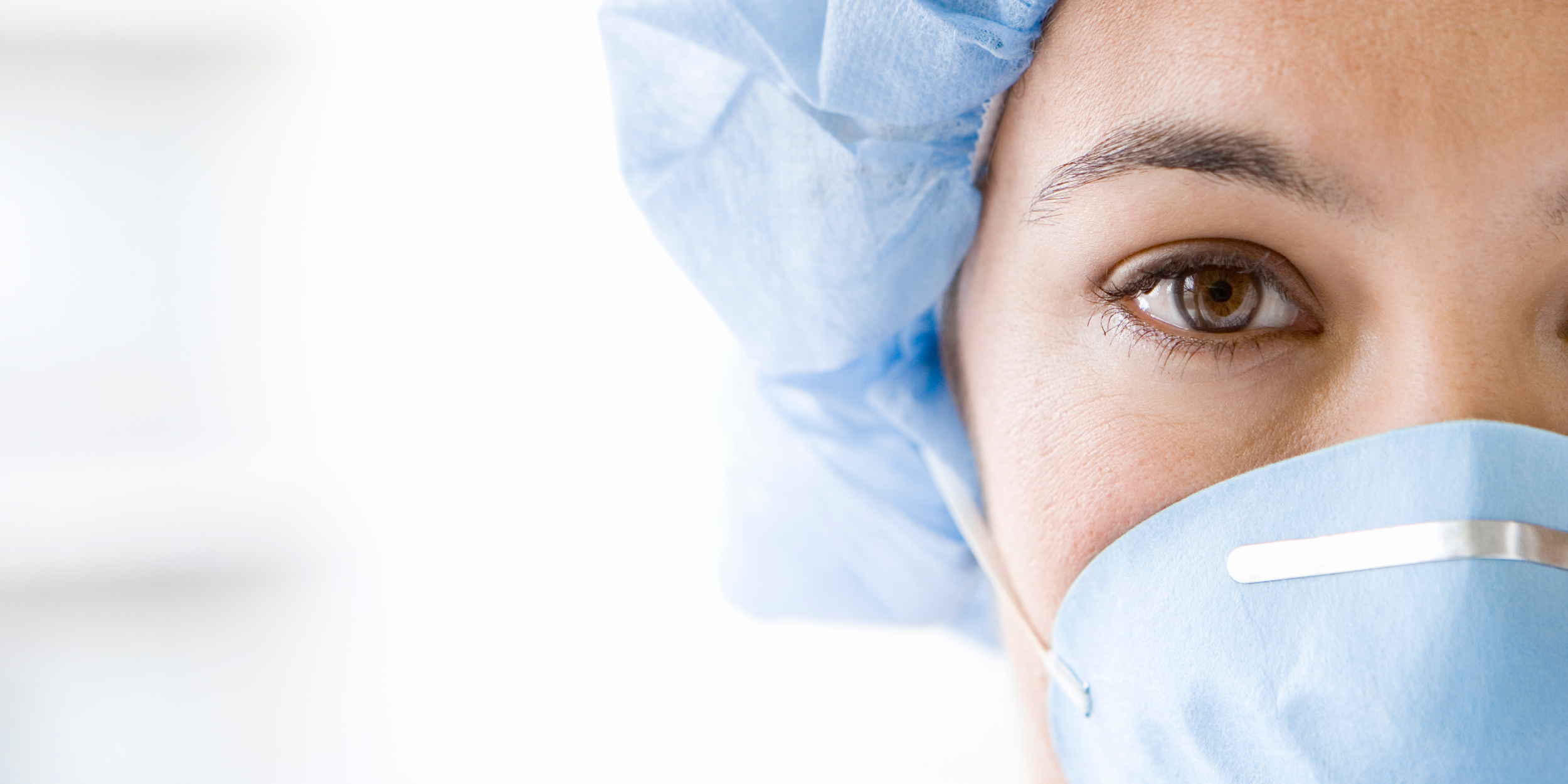
New teaching methodologies to enhance leadership competencies and their components (strategic thinking, emotional intelligence, impact and influence, and teamwork) across all bachelor’s degrees.
Interprofessional methodology
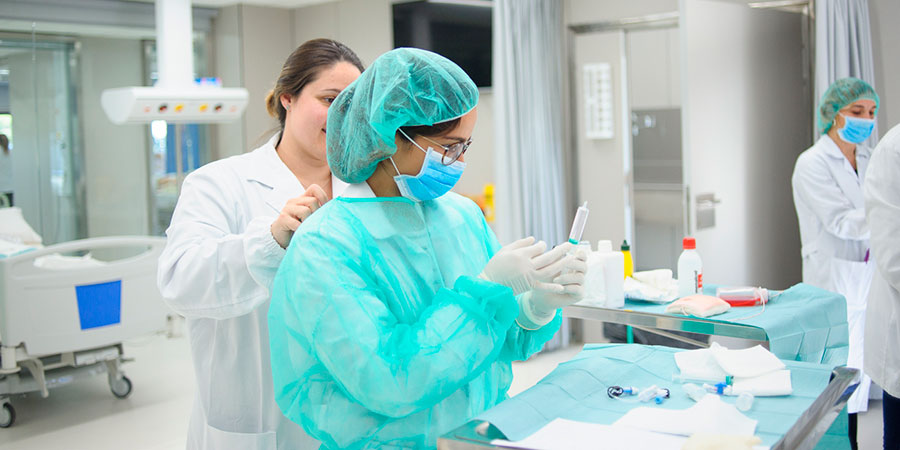
Interprofessional methodology with Medicine, Physiotherapy, Bioengineering, Dentistry, Biomedical Science (Biomedicine) and Psychology students.
Three majors
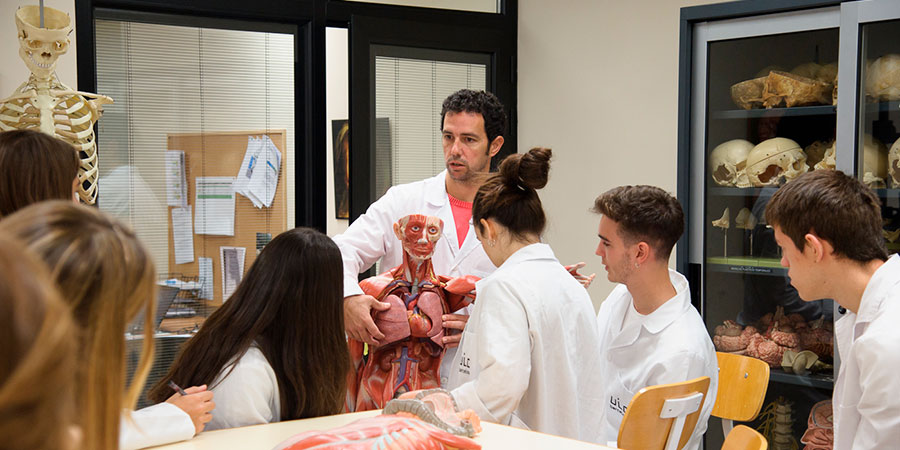
You will be able to choose between three majors: Advanced Clinical Care, Community Care or International Nursing (in English).
Clinical practice from Year 1
Comprehensive Centre for Advanced Simulation with more than 1,000 m2
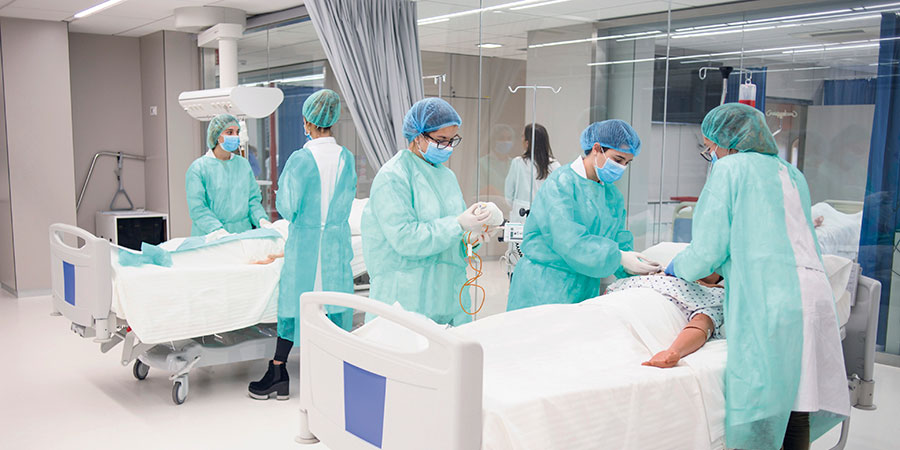
It recreates the different areas of the healthcare environment: outpatient area, home care area, surgical area, specialised area and hospital admission area with 16 beds. It also offers training, debriefing and image control rooms with video recording facilities in all settings.
Competence-based evaluation using the ACOE method
UIC Barcelona is a pioneer in using ACOE (objective structured clinical evaluation) for their Bachelor's Degree in Nursing in Spain. Students carry out a series of simulated practical activities throughout the academic year and finish with an ACOE (except in the fourth year).
The opportunities to develop your professional career take you as far as you like
At UIC Barcelona, we train you to develop your professional career, both locally, nationally and internationally, within different clinical settings: hospitals, primary care centres and social-health centres. We train you in the four areas of nursing:
- Care
- Management
- Teaching
- Research
UIC Barcelona Nursing in numbers
Excellence in the effectiveness of learning support systems:
In their own words
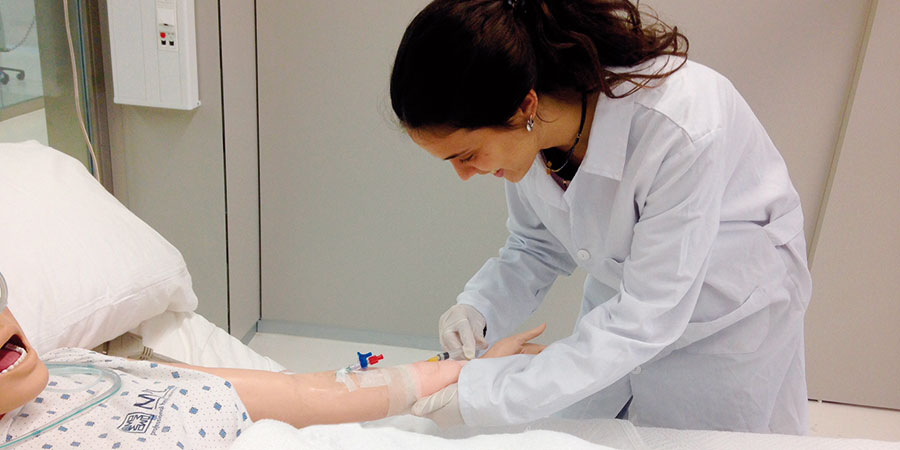
“For me, UIC Barcelona is a space where I can develop my knowledge and values, in an international and personalised setting with specialised professionals. It is more than a university, because it gives you the chance to enjoy an experience abroad, as well as extracurricular activities. Also, we can gain practical experience right from the start thanks to the University's different collaboration agreements.”
Laura Gutiérrez
Nursing student
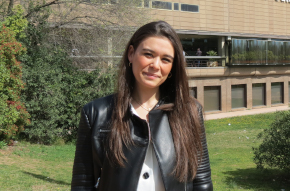
“We have expert lecturers, well-equipped simulation rooms and a wide range of centres where we can do internships that help us to train as nurses and grow at a personal level.”
Judit Torres
Nursing student
Additional information
Presentation
Our mission is to improve the health ofour society. To this end you will develop international compe-tences through individual attention.
Further your commitment to public health and learn through self-discipline. We strive to ensure that you become a competent, reflexive professional who is capable of adapting to change and the needs of today's society.
The curriculum for the Bachelor’s Degree in Nursing at UIC Barcelona has been designed to teach students using active educational methodologies with a strong focus on leadership.
The curriculum also allows students to work in healthcare facilities and interact with patients from the first year, and to complement their theoretical and practical learning in simulation laboratories, also from day one.
These are our values:
- Commitment
- Scientific rigour
- Service-mindedness
- Professionalism
We believe in your ability to become a nursing professional capable of providing efficient solutions.
Objectives
Our education is target-based. The Bachelor's Degree in Nursing will provide:
- Knowledge of how to assess and evaluate people in a holistic manner.
- A command of patient care , which will help you promote, restore and maintain optimal health.
- Perspective when selecting and integrating your health knowledge and making value judge-ments.
- The ability to identify altered health conditions.
- Knowledge of how to develop programmes aimed at educating people, families and community and promoting wellness.
- The ability to handle, analyse and disseminate research that enhances nursing-related knowledge and practices.
Who is it intended for? Prospective students
If you are proactive, committed to society and feel the field of health and science is your calling, nurs-ing is the right profession for you. We recommend you have a background in health sciences.
Our nursing students share the following aptitudes:
- Organisation, memory and motivation
- Quick decision-making skills
- Psychological skills and empathy
- Emotional balance
- An interest in research
- Responsibility
- Observation skills
- Teamwork
- An interest in helping people and the community
Job opportunities
You will be qualified to become a full health care team member or develop competences in other set-tings:
- Public and private hospitals
- Public and private social health centres
- Mental health facilities
- Primary care centres
- Health education in primary and secondary schools
- Teacher at a vocational training centre (health care training courses)
- Self-employed home care worker
- Care homes and centres for the elderly
- Institutions for the mentally and physically handicapped
- Pre-hospital and emergency services
- Occupational risk prevention services
- Professional associations
- Patient associations
- Prison facilities
- University-based schools of nursing
Competences. Course objective
Academic accreditation
Graduado o Graduada en Enfermería por la Universitat Internacional de Catalunya.
If you wanted, you could also obtain one of the following three degree programme specialisations:
- Advanced Clinical Care
- Community Care
- International Nursing
Advisory Committee
Teachers
- ABDÓ MIGUEL, Andrea
- ACOSTA DIEZ, Juan
- ACOSTA GALLEGO, Ana
- AGUDO UGENA, José Pablo
- ALAMOS LOPEZ, Constanza
- ALFONSO ARIAS, Cristina
- ALIAGA MARSILLACH, Monica
- ALSINA CASANOVA, Mª Guadalupe
- ALSINA CASANOVA, Miguel
- ÁLVAREZ FLORES, Lidia
- AMIL BUJAN, Paloma
- ARBONÉS ARQUÉ, Daniel
- BALDRÍS CATAFAU, Judit
- BAU SERRANO, Blanca
- BEJARANO CABRERIZO, Eira
- BERROZPE BLASCO, Adela
- BODAS MARTÍNEZ, María del Mar
- BOIXADERA VENDRELL, Mireia
- BRAÑAS OLIVERAS, Cristina
- BRICHS MASNOU, Laura
- BUENO JIMÉNEZ, David
- BUSQUETS BUEREN, Núria
- CABANAS VALDÉS, Rosa María
- CALPE DAMIANS, Neus
- CANET VINTRÓ, Máxim
- CANO PLANS, Sara
- CARO MANSO, Carolina
- CASALS FARRÉ, Núria
- CASTILLO GARCIA, Jordi
- CASTRO OLLERO, Sonia
- CHANEY, Alexis Dawn
- COLET MASEGOSA, Martí
- COLET MASEGOSA, Martí
- COLOMINAS CALLEJAS, Miriam
- CONDE FERNANDEZ, Montserrat
- CURADO SANTOS, Estel
- DA PALMA AFONSO, Elsa Sofía
- DE JUAN PARDO, María Ángeles
- DELGADO ALVAREZ, Beatriz
- DEL REY VITÓ, Silvia
- DEPARES AGUILAR, Inés
- DE PAZ CANTOS, Sonia
- DÍEZ QUESADA, Blanca
- DISTLER, Susan
- DOMINGO MANERO, Pere
- DUMONT, Thomas Alexander
- ESTARELLAS PARDO, Juana Ana
- FERNÁNDEZ CAPO, Maria
- FERNÁNDEZ GRANADERO, Sandra
- FERRAN RODRÍGUEZ, Virginia
- FUERTES GUIRO, Fernando
- FUERTES VILLALBA, Anna
- FUSTER LINARES, Maria del Pilar
- GALLART FERNANDEZ-PUEBLA, Alberto
- GÁMIZ SANFELIU, María Guadalupe
- GARCIA ARTEAGA, Elisabet
- GARCÍA SALANOVA, Aina
- GIL DE AVALLE MUÑOZ, Ana
- GIL SÁNCHEZ, Esther
- GOÑI FUSTE, Blanca
- GRANADO CALVILLO, Cristina
- GUERRERO TORRELLES, Maria
- GUIMET VILLALBA, Ana Gloria
- HELEY, Alexandra
- IGLESIAS MONROBEL, Carina
- IRUELA SÁNCHEZ, María Mercè
- JIMÉNEZ JIMÉNEZ, Javier
- JIMENEZ JIMENEZ, Sandra
- JUNQUÉ JIMÉNEZ, Anna Maria
- LÓPEZ LÓPEZ, Alejandro
- LÓPEZ MADRIGAL, Claudia
- LOPEZ OGANISSIAN, Aleix
- LÓPEZ RUIZ, Antonio Luis
- LOSADA LÓPEZ, María del Carmen
- MACPHERSON MAYOL, Ignacio
- MARCO FERRERA, María Blanca
- MARTÍN DELGADO, Leandra
- MARTÍNEZ CAMPO, Yolanda
- MARTÍNEZ JAIMEZ, Patricia
- MARTINEZ NAVARRO, Javier
- MARTÍNEZ SARNAGO, Lidia
- MARTÍN FERRERES, María Luisa
- MARTOS ALGARRA, Carla
- MET, Yagmur Elif
- MEZQUITA MAS, Betlem
- MIR ABELLAN, Ramón
- MONFORTE ROYO, Cristina
- MONTALBÁN MARTÍNEZ, Elena
- MORALES BENITO, Isabel
- MORENO CARRILLO, Pilar
- MORENO FERNÁNDEZ, Carmen María
- MORENO ORTEGA, Laura
- MOYA CARRILLO, María Lorena
- NAQUI XICOTA, Cristina
- NAVARRO, Emiliano
- NAVAS BONILLA, Laura
- NAVAS GUERRERO, Lara
- NEBOT RODRIGO, María Núria
- NOGALES SANTOS, Silvia
- OLIVER CASANOVA, Xavier
- PACHECO DORIA, Mauricio
- PEDROSA CEBADOR, Ramón
- PÉREZ BELLMUNT, Albert
- PÉREZ DE GRACIA, David
- PÉREZ RODRÍGUEZ, Sandra
- PILAR CABALLO, Sílvia
- PLANAS MAS, Joan
- PLAZA RAIMUNDO, Aitana
- PORTILLO TOMÁS, Marina
- POSA VAL, Verónica
- PREIXENS HERRERA, Andrea
- QUILES RODRIGO, Susana
- RAMO GONZALEZ, Ingrid
- REDONDO LÓPEZ, Nieves
- REGAÑA VELÁZQUEZ, Daniel
- ROBLEDA FONT, Gemma
- RODRÍGUEZ GIL, Raquel
- RODRÍGUEZ HIGUERAS, Encarna
- RODRÍGUEZ RODRÍGUEZ, Rosalía
- RODRÍGUEZ TRIVIÑO, Carmen
- RODRÍGUEZ TRUJILLO, Mireia
- ROSILLO MARZO, Oscar
- ROSSY I PARÉS, Clàudia
- RUBIO GARRIDO, Patricia
- SALINAS FERNANDEZ, Paola
- SÁNCHEZ ARANDA, Alberto
- SANTANA MARTÍNEZ, Miguel Daniel
- SEGARRA TORRES, Carmen
- SENDRÓS FERNÁNDEZ, Marc
- SIMÓN FABREGAT, Blanca
- TÁRREGA HERRERO, Carla
- TORTOSA TRANCHO, Laura
- TRULLOLS GIL-DELGADO, Luis Fernando
- VASYLETS, Olena
- VELÁZQUEZ SÁNCHEZ, Diego
- VICARIO MARTOS, Concepción
- VILA PÉREZ, Ferran
- WENNBERG CAPELLADES, Laia
- ZÁRATE RIVERO, Belén
Internship
Related links
The student's learning experience extends beyond the limits of the classroom into what will become their future care-giving setting.
Objectives
Throughout the practical programme, students will learn to:
- Integrate theoretical knowledge with practical knowledge, and acquire the attitudes and skills necessary for providing professional care in different situations.
- Identify the different components of the disease-health process using critical reasoning.
- Develop emotional, relational and communication skills over the course of the therapeutic relationship with patients, families and the community.
- Take care of the person over the course of their different states of health, such as illness, recovery or promotion of health by applying the nursing care process (PAE).
- Apply the knowledge acquired throughout the programme in a holistic manner (knowledge, skills, attitudes).
- Acquire expert knowledge and strategies used by professionals in the application of protocols.
- Study and practice the different roles involved in nursing.
- Understand the roles of other members of the healthcare team.
- Integrate within a multidisciplinary team.
- Find your place in the structure and operation of the centre.
- Understand the nursing activities involved in different fields of action.
- Manage resources responsibly.
Organisation of the practicums
The Universitat Internacional de Catalunya offers students the chance to undertake a clinical practicum at the end of their first year. These are carried out in prestigious hospitals and primary care centres that work with accredited teaching professionals.
Each student is tutored by a healthcare professional during the practicum (clinical tutor). In addition, a university lecturer (academic tutor) monitors the student through visits to the practicum centre, to ensure the student's learning and satisfaction and encourage reflection on the experience.
The coordinator and practicum tutor plan and oversee the student’s experience to ensure that it is successful.
Clinical practicums are distributed throughout the degree programme as follows:
- During the first year, students come into contact with the professional nursing care setting.
- During the second year, students participate in providing supervised adult care in community and general hospital settings.
- During the third year, students will help care for adults and older people and their environment in community, social and health and specialised hospital settings.
- In their final year, students will enhance their skills by adopting new nursing roles: in specific situations according to their chosen specialisation and as a teacher in health education programmes for specific population groups.
The distribution of places and assigned shifts according to the student's personal practical curriculum will be planned well in advance and individual interviews will be scheduled with each student to assign each placement.
It is important to remember that placement’s shifts do not follow the academic timetable, and may vary according to the centre offering the placement. The student must adapt to the shifts they are given, which may be morning/afternoon/night, or covering the busiest period of the day (deslizante/lliscant).
Practicum weeks by subject and year:
|
YEAR |
SUBJECT |
CATEGORY |
PRACTICUM WEEKS |
|
|
First year |
Introductory Practicum |
P.E.* |
6 WEEKS |
|
|
Second year |
General Practicum I |
P.E. |
6 WEEKS |
|
|
General Practicum II |
P.E. |
5 WEEKS |
||
|
Third year |
Advanced Practicum I |
P.E. |
4 WEEKS |
|
|
Advanced Practicum II |
P.E. |
4 WEEKS |
||
|
Advanced Practicum III |
P.E. |
4.5 WEEKS |
||
|
Advanced Practicum IV |
P.E. |
4.5 WEEKS |
||
|
Fourth year |
Synthesis Practicum I |
P.E. |
6 WEEKS |
|
|
Profile Practicum I |
O.P.* |
4 WEEKS |
||
|
Profile Practicum II |
O.P. |
4 WEEKS |
||
|
Synthesis Practicum II |
P.E. |
6 WEEKS |
* Práctica externa obligatoria
** Asignatura optativa que el alumno deberá hacer obligatoriamente con o sin mención
This distribution ensures compliance with the European Union directive on clinical practice in nursing studies, which establishes that the minimum be 2,300 hours of practical experience in healthcare settings.
Final Degree Project
The Final Degree Project is a compulsory subject equivalent to 12 ECTS. It forms part of the Bachelor’s Degree in Nursing and is a requirement of the 4th year of the Bachelor’s degree, when it will also be submitted and marked. As outlined in Order CIN 2134/2008 of 3 July, the Final Degree Project (TFG) is a cross-disciplinary subject of which the content will be related to a variety of subject matters. The TFG is fundamentally a self-led project that each student will complete under the guidance of a tutor, who will help to motivate and facilitate their learning. The TFG must demonstrate the acquisition of competences and content received during the Bachelor’s Degree in Nursing and, in this sense, be presented as a comprehensive piece of work.
Prerequisites
The TFG is the final subject of the degree programme. For this reason, students can only enrol during the final enrolment period of the Bachelor’s degree. As usual, enrolment must not exceed 72 ETCS per academic year.
Objectives
Upon completing the Final Degree Project, students will be able to:
- Integrate knowledge of the basic health sciences, humanities and social sciences to solve health problems of individuals, families and the community.
- Recognise how the nursing care process is applied to the profession and to clinical cases, and use scientific evidence as a basis for planning nursing care.
- Adapt the application of clinical intervention protocols in healthcare practice, taking into account the multicultural environment, within a reference framework of the system’s healthcare quality and sustainability.
- Participate in strategies to improve nursing care.
- Publicly defend and present your Final Degree Project.
Prerequisites & admissions
Application for admissions
To pre-register for undergraduate studies at UIC Barcelona, you will need to complete the application form available at the following link:
Required documentation
The documentation required for the admission process varies according to each candidate’s academic background. Click on the following link to see what documents you will need to provide:
Entrance exam results
Reservation and enrolment
In order to reserve a place on the programme, admitted candidates must pay 20% of the first year fee upon receiving their letter of acceptance.
The remaining 80% is due after enrolment.
For more information:
Acces routes
Programme applicants may come to UIC Barcelona from different academic backgrounds. Click on the following link for detailed information on the route most pertinent to you:
Grants & financial aid
Grants
UIC Barcelona offers various fellowships supported by both public institutes (MEC or AGUAR) as well as private UIC Barcelona funds.
For further information, please check with our admissions department:
Financial aid
Each payment method is adhered to the specific financing conditions of each degree programme.
Please see the attached document for details on these conditions:
Discounts
Those seeking undergraduate degrees at UIC Barcelona may be eligible for different discounts depending on their circumstances.
Faqs
General information about the Bacherlor's Degree
How many places are available on the Bachelor’s Degree in Nursing?
125 places.
How much does the first year of the Bachelor’s Degree in Nursing cost?
Please visit uic.es/salud for the most up-to-date information.
Do students need to buy books for classes?
No, all teaching materials are available on the University’s digital platform and in the library.
Are there any grants or financial aid for the Bachelor’s Degree in Nursing at UIC Barcelona?
You can find out all the various options including grants, discounts, and fee waivers, as well as the terms and conditions for loans on our website. If you have an average mark of 8 or higher in your first year of upper secondary education or a 9 or higher in your first year of Higher Vocational Education and Training (CFGS), and you are currently in your second year, you are eligible for a Grant for Academic Excellence, which entitles you to an 80% discount every year of study.
What is the class timetable?
Class hours are from 8.00 a.m. to 2.00 p.m. and there may be some afternoon classes for joint activities with medical students. Work placement schedule: mornings, afternoons or nights in highly technical services.
When do the placements start?
Hospital placements begin in the second semester of the first year with the aim of immersing the student in a clinical environment from the beginning. Practical work experience is at the centre of student training.
The University also has its own Comprehensive Centre for Advanced Simulation (CISA) of about 1,000 m2, in which first year students complete practical classes in small groups.
Do students get practical experience in all clinical areas and specialisations of the bachelor’s degree?
Yes, we try to ensure that students get as much experience as possible in all clinical units and specialisations.
You will deal with all patient profiles, from children to adults of all ages.
Acces routes to the Bacherlor's Degree Programme
Can I apply for the entrance examinations if I have a social, humanities or artistic baccalaureate/upper secondary qualifications?
Yes.
Can I take the entrance examinations if I have taken a Higher Level Vocational Training Course (CFGS) not related to health?
Yes.
Are any of my subjects recognised if I have started a CFGS in the area of health?
If you have studied a CFGS in: Imaging for Diagnosis, Pathological Anatomy and Cytology, Clinical and Biomedical Laboratory or Radiotherapy, you will have 12 credits recognised automatically, corresponding to the subjects of Structure and Function of the Human Body I and II.
Are any of my subjects recognised if I have started university studies in the area of health?
If you have begun but not finished your studies or have requested an academic record transfer, you may request that your previous academic merits be recognised once you have been accepted. In order to do so, you must provide a series of documents within the established timeframe. If you have worked as a nursing assistant in the last year and a half for more than 6 consecutive months, this practical experience can be recognised as an initial practical placement of the first year.
In order to do so, you must provide a series of documents before the established date.
If I already have a university degree, do I still need to take the entrance exams?
Yes, to gain admission into the Bachelor’s Degree in Nursing, you must take the entrance exams regardless of your situation.
Admission tests and process
What is the cut-off mark for admission into the Bachelor’s Degree in Nursing?
As this is a private university, there is no cut-off requirement. Admission into the bachelor’s degree will depend on the outcome of the relevant entrance exams from our university.
What do the entrance exams involve?
Baccalaureate and other access routes
Subject matter corresponding to the 1st year of the baccalaureate:
- Reading comprehension
- An emotional intelligence test.
- Specific assessment of knowledge in biology, chemistry and calculus (proportionality, conversion factors, decimal metric system, rules of three, etc.).
- Personal interview.
Higher vocational education and training courses (CFGS)
The tests will be as follows:
- Reading comprehension
- An emotional intelligence test.
- Specific knowledge test with of questions about health-related topics.
- Personal interview
Can I choose the date of the entrance exam?
You can ask for a specific date; however you must wait from confirmation from the Information and Admissions Service who will confirm the exam dates via email once they have looked over your documentation.
Are there any practice exams available?
We do not provide past papers from previous years.
Are the exams multiple choice?
Yes.
Should I have a certified B2 language level?
To obtain the bachelor’s degree, the student must present a certificate that certifies a level B2 in a foreign language (as with all bachelor’s degrees).
How are the marks on my academic record and the entrance exams weighted?
- 50 % admission tests
- 25 % interview
- 25 % dossier
What are the exam times?
They start at 9.00 a.m. and last about an hour and a half.
Can I choose the date of the entrance exam?
The results will be sent to you by e-mail approximately 15 working days after the exams.
If I am ‘not admitted’ can I attend the next sitting during the same academic year?
No, you can only attend one sitting per academic year.
If I have been admitted, what is the next step?
You will receive a letter of admission containing information about the next steps to take in order to reserve a place on the course, which corresponds to 20% of the fee for first year. The remaining 80% will be paid during the registration period (40% in July, 20% in January and 20% in March).
If I reserve a place and then decide not to study at UIC Barcelona, will the reservation fee be reimbursed?
The reservation fee will only be fully reimbursed in event you do not pass your upper secondary studies or the Spanish university entrance exams (PAU).
This clause is laid out in the general terms and conditions.
International mobility
Study abroad temporarily
As a student in this degree programme, you may complete part of your degree or a work experience placement abroad and receive academic recognition.
Spend a semester or a full academic year at one of your Faculty’s partner universities or find a company abroad to do an internship. You may also:
- Attend the Berkeley Summer Sessions (extracurricular activity) the world’s best public university.
For information about everything you need to do before, during and after your mobility stay, check out the "Study abroad" section and download all the documentation specific to your Faculty:
Study with us temporarily
If you are studying at another Spanish or foreign university, you can come to UIC Barcelona to study temporarily for one semester or a full academic year.
Visit the “International exchange students site” for more information and, download here all the specific documentation of this faculty:
